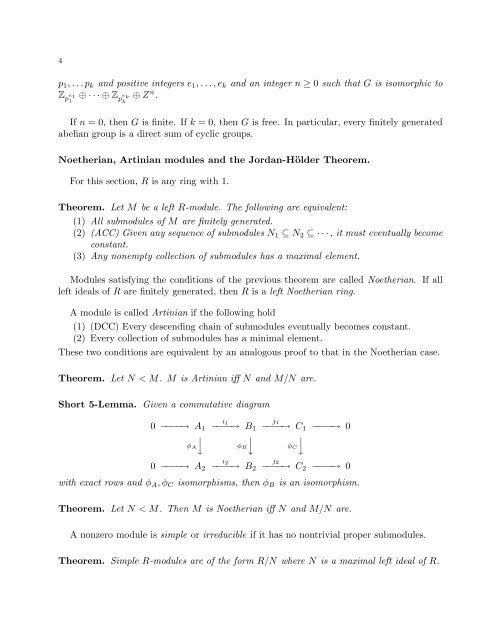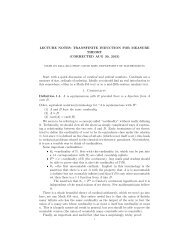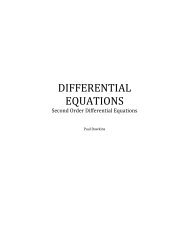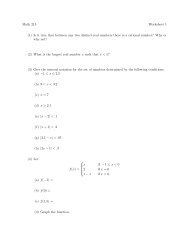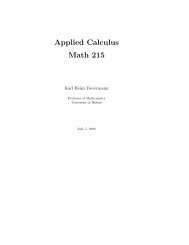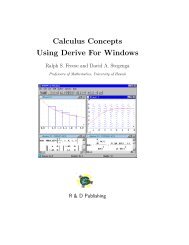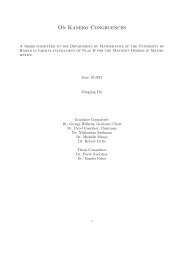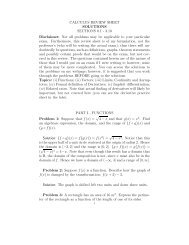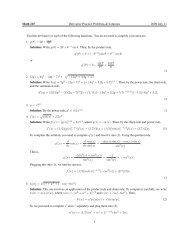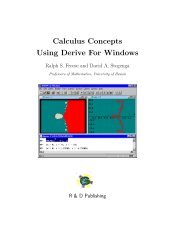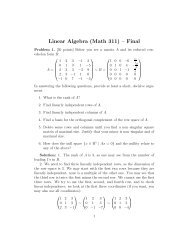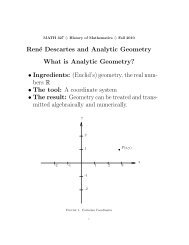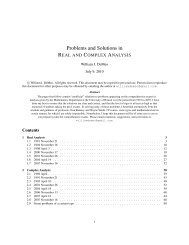Module Theory From now on, R will denote an arbitrary ring with 1 ...
Module Theory From now on, R will denote an arbitrary ring with 1 ...
Module Theory From now on, R will denote an arbitrary ring with 1 ...
You also want an ePaper? Increase the reach of your titles
YUMPU automatically turns print PDFs into web optimized ePapers that Google loves.
4<br />
p1,...pk <strong>an</strong>d positive integers e1,...,ek <strong>an</strong>d <strong>an</strong> integer n ≥ 0 such that G is isomorphic to<br />
⊕Zn .<br />
Z p e 1<br />
1 ⊕···⊕Z p e k<br />
k<br />
If n =0,thenGis finite. If k =0,thenGis free. In particular, every finitely generated<br />
abeli<strong>an</strong> group is a direct sum of cyclic groups.<br />
Noetheri<strong>an</strong>, Artini<strong>an</strong> modules <strong>an</strong>d the Jord<strong>an</strong>-Hölder Theorem.<br />
For this secti<strong>on</strong>, R is <strong>an</strong>y <strong>ring</strong> <strong>with</strong> 1.<br />
Theorem. Let M be a left R-module. The following are equivalent:<br />
(1) All submodules of M are finitely generated.<br />
(2) (ACC) Given <strong>an</strong>y sequence of submodules N1 ⊆ N2 ⊆···, it must eventually become<br />
c<strong>on</strong>st<strong>an</strong>t.<br />
(3) Any n<strong>on</strong>empty collecti<strong>on</strong> of submodules has a maximal element.<br />
<str<strong>on</strong>g>Module</str<strong>on</strong>g>s satisfying the c<strong>on</strong>diti<strong>on</strong>s of the previous theorem are called Noetheri<strong>an</strong>. If all<br />
left ideals of R are finitely generated, then R is a left Noetheri<strong>an</strong> <strong>ring</strong>.<br />
A module is called Artini<strong>an</strong> if the following hold<br />
(1) (DCC) Every descending chain of submodules eventually becomes c<strong>on</strong>st<strong>an</strong>t.<br />
(2) Every collecti<strong>on</strong> of submodules has a minimal element.<br />
These two c<strong>on</strong>diti<strong>on</strong>s are equivalent by <strong>an</strong> <strong>an</strong>alogous proof to that in the Noetheri<strong>an</strong> case.<br />
Theorem. Let N


